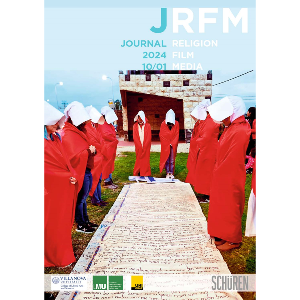JRFM: Heft 10.1 | Fiction, Religion and Politics in The Handmaid’s Tale
15.05.2024
Journal for Religion, Film and Media
15.05.2024
Journal for Religion, Film and Media

Natalie Fritz and Daria Pezzoli-Olgiati (eds.)
Since its publication in 1985, The Handmaid’s Tale, a novel by Margaret Atwood, has had an enormous impact on different media productions, from opera to graphic novel to a much-acclaimed TV series. The novel develops a disturbing vision of the theocratic, totalitarian state Gilead. The narrator records fragments of her everyday life as a “handmaid”, one of the women assigned as slaves to the elite’s families for reproductive purposes. Atwood’s novel points out how religious and political fanaticism fuel social violence, inequality, and the abolishment of individual rights. With its clear articulation of widespread fears concerning contemporary democracy and its future – dystopian – developments, The Handmaid’s Tale has become a global cultural phenomenon.
The articles gathered in this issue approach the complex interdependence of fiction, religion and politics in The Handmaid’s Tale in light of the novel of 1985 and the Hulu series that started in 2017. The articles by Friedhelm Hartenstein, Ann Jeffers, and Bina Nir offer a close reading of the use of biblical references in the novel, analysing the ambivalent role of religion in the (de-)legitimation of a destructive political power. Simon Spiegel focuses on the TV series and explores the transformation of the dystopian novel into a serial drama, and the paradoxical challenges of the serie’s success. The articles of the thematic section are introduced by the editors’ contribution that describes the processes of the narrative’s diffusion across media and contexts, and the hermeneutical power of this dystopian universe to address the interplay of religion and politics.
The issue can be downloaded at JRFM or can be ordered in print from Schüren.